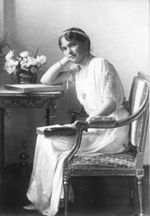Grand Duchess Olga Nikolaevna of Russia
Grand Duchess Olga Nikolaevna of Russia (Olga Nikolaevna Romanova) (In Russian Великая Княжна Ольга Николаевна), also known as Olishka or Olya. (November 3 (O.S.)/November 15 (N.S.) 1895 - July 17, 1918), was the oldest daughter of Nicholas II of Russia and Alexandra of Hesse. She was the oldest sister of the Grand Duchesses Tatiana, Maria, and Anastasia of Russia, and of Tsarevich Alexei of Russia. Her paternal grandparents were Alexander III and his consort Maria Fyodorovna. Her maternal grandparents were Ludwig IV, Grand Duke of Hesse and by Rhine and Princess Alice of the United Kingdom. She is also the great-granddaughter of Queen Victoria and Prince Albert of Saxe-Coburg and Gotha on her mother's side.
Overview
She was christened in the Chapel at the Catherine Palace. Her godparents were The King of Denmark, The Grand Duke of Hesse, Grand Duke Vladimir Alexandrovich of Russia, The Dowager Empress of Russia, The Queen of England, The Empress of Germany, The Queen of Greece, and Grand Duchess Olga Alexandrovna of Russia.
Olga was the most intelligent of Nikolai II's children. She was known for her compassionate heart and desire to help others, but also for her temper and blunt honesty. Olga loved to read anything she could get her hands on. She enjoyed reading about politics and read newspapers. Olga also loved her mother's book selection. She would usually take a book before her mother read it and tell her "You must wait, Mama, until I find out whether this book is a proper one for you to read."
Before World War I, there was some discussion of a marriage between her and Prince Carol of Romania (and also the Prince of Wales, later Edward VIII, was a suitor), but Olga did not like Carol and the plans were, in any event, put on hold upon the outbreak of war.
During World War I Olga served as a nurse. The whole family served a part in the war. Olga's nurse work ended when she had a nervous breakdown. The war took a toll on the whole family. She knew the financial and political state of the country during the war and during the revolution as well. She even knew how the Russian people disliked her mother and father. She was very close to her brother during the war.
The Russian parliament, before Nicholas's abdication, hoped for her to be regent for her brother Alexei. She was twenty-two when she was executed with her family at the Ipatiev House in Ekaterinburg on July 17, 1918, after a year of imprisonment following the February/March Revolutions of 1917. The execution was carried out by forces of the Bolshevik secret police under Yakov Yurovsky.
In 2000, she and her family were canonized by the Russian Orthodox Church.
Ancestry
